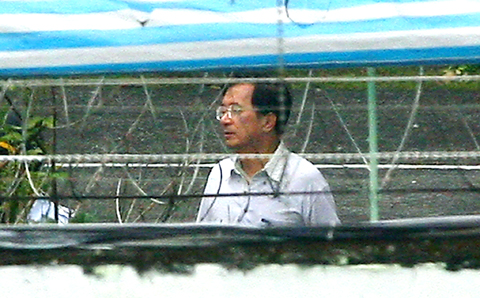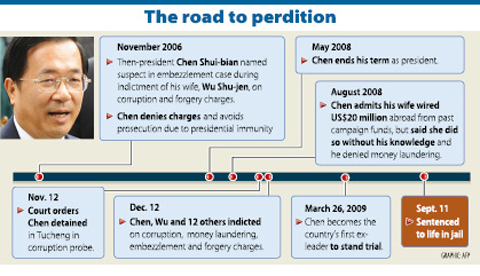The Taipei District Court yesterday sentenced former president Chen Shui-bian (陳水扁) and his wife to life in prison after handing down a guilty verdict in the graft trial against the former first couple and 11 co-defendants.
The verdict makes Chen the first former president in the country’s history to be indicted and convicted.
Presiding Judge Tsai Shou-hsun (蔡守訓) began reading from the court’s 1,000-page verdict at 4pm. Chen received a life sentence, a fine of NT$200 million (US$6.1 million) and had his civil rights annulled for life for violating the Punishment of Corruption Act (貪污治罪條例), Money Laundering Control Act (洗錢防制法) and Criminal Code (刑法).

PHOTO: AFP
Chen chose not to attend yesterday’s proceedings. Lee Ta-chu (李大竹), deputy warden at the Taipei Detention Center, where Chen has been imprisoned since Dec. 30 last year, said that the former president went about his daily activities as usual.
Lee said the former president was calm after finding out about his sentence through TV news.
The court ruled that Chen, during his term as president, “for selfish reasons … used his power to create wealth while putting aside integrity and loyalty to the country.”

The ruling states that as president, Chen should have known that “if one person in power developed a greed for the people’s money, the entire country would devolve into chaos.”
The court found Chen and his wife guilty of embezzlement and taking bribes totaling NT$800 million, some of which was laundered overseas through Swiss bank accounts and paper companies.
Former first lady Wu Shu-jen (吳淑珍) was given a life sentence, a fine of NT$300 million and also had her civil rights annulled for life. The ruling states that although the court was sympathetic toward her disability, as a former legislator Wu “knows the country’s money comes from its hardworking people,” yet “used her position countless times to obtain large amounts of public funds to be used for personal expenses.”
However, because Wu has been in a wheelchair since an incident in 1985 and needs full-time care, she might be allowed to serve out her sentence in an alternative way, such as house arrest.
In the money laundering case, Chen Shui-bian’s son, Chen Chih-chung (陳致中), was sentenced to two years and six months, as well as a fine of NT$150 million, for helping his parents wire money to overseas bank accounts.
Chen Shui-bian’s daughter-in-law, Huang Jui-ching (黃睿靚), was sentenced to one year and eight months and fined NT$150 million on money laundering charges.
Speaking briefly to reporters after hearing the verdict, Chen Shui-bian’s court-appointed attorney Tseng Te-rong (曾德榮) said he found the life sentence “rather heavy,” but declined to comment further, saying that he would first need to read through the entire ruling.
Cheng Wen-lung (鄭文龍), a former attorney for Chen Shui-bian, said the ruling was a “political ruling” because the court handed down a guilty verdict when there was no proof Chen Shui-bian was guilty.
Lin Chih-hung (林志忠), an attorney for the former first lady, said the sentence was too heavy and would advise her to appeal the ruling.
Yeh Ta-hui (葉大慧), an attorney for Chen Chih-chung and his wife, said he would discuss whether to appeal the ruling after he receives a copy of it. However, Yeh said that even if they decided to appeal, the young couple would not change their decision to plead guilty in hopes of leniency.
The Supreme Prosecutors’ Office said prosecutors would decide whether to appeal after they receive a copy of the ruling.
Two former presidential aides, former deputy secretary-general Ma Yung-cheng (馬永成) and former Presidential Office director Lin Teh-hsun (林德訓), were found guilty of helping the former first family embezzle money from public funds and were sentenced to 20 and 16 years respectively and had their civil rights annulled for 10 and eight years respectively.
The court said the former first family’s bookkeeper Chen Chen-hui (陳鎮慧) escaped a prison sentence because she showed remorse for her crimes and provided key evidence to prosecutors and judges, including computer records she kept detailing the former first family’s official and personal expenses.
The former president and his wife were found guilty of receiving kickbacks from a development company to pave the way for the construction of the Hsinchu Science Park by purchasing a plot of land in Taoyuan County from the company at a price prosecutors argued was unreasonably high.
Former Hsinchu Science Park head James Lee (李界木) and Wu’s friend Tsai Ming-che (蔡銘哲) were found guilty of pocketing part of the money and transferring kickbacks to accounts held by family members of Chen Shui-bian and Wu.
Lee was sentenced to six years in prison and had his civil rights annulled for three years. Tsai Ming-che was sentenced to two years in prison and five years probation. His brother Tsai Ming-chieh (蔡銘杰) was also found guilty of taking kickbacks and received a two-year prison sentence and five years probation.
The ruling found the former first family guilty of collecting bribes from contractor Kuo Chuan-ching (郭銓慶) between 2002 and 2003 to help him win a tender to build the Nangang Exhibition Hall. Kuo was sentenced to six months in jail, of which three months have been suspended.
Prosecutors argued that Kuo won the contract by bribing members of a panel organized by the Ministry of the Interior to assess the bidding after then-interior minister Yu Cheng-hsien (余政憲) revealed the list of panel members to Kuo at Wu’s request.
Tsai Ming-chieh and Kuo early last month pleaded guilty to helping Wu obtain US$2.73 million in bribes in connection with a land deal in Longtan (龍潭), Taoyuan County.
Yu has also been indicted for allegedly leaking secrets, but the court has not yet passed a verdict in his case because he is not one of the co-defendants in the Chen Shui-bian case.
BRIBES
The District Court also found Chen Shui-bian and his wife guilty of some of the charges prosecutors added against them on May 5. These include taking NT$10 million in bribes from former Taipei Financial Center Corp (台北金融大樓公司) chairwoman Diana Chen (陳敏薰) and NT$300 million in political donations from former Chinatrust Financial Holding Co (中信金控) vice chairman Jeffrey Koo Jr (辜仲諒).
Members of the former first lady’s family and some of her friends also received prison sentences for helping her launder money.
Wu’s brother Wu Ching-mao (吳景茂) and his wife, Chen Chun-ying (陳俊英), who pleaded guilty to helping the former first lady launder money through overseas accounts, were each sentenced to two years in prison, five years’ probation and a fine of NT$3 million.
Tsai Mei-li (蔡美利), a classmate of the former first lady, is critically ill and has not been sentenced. She allegedly also played a role in the money-laundering schemes.
In related news, the Taipei District Court yesterday said it respected Chen Shui-bian’s decision not to appear in court to hear the ruling. The court’s decision not to require his presence signals that the detention hearing would be held next week at the earliest, or at the High Court if the appeal is processed before the former president’s current term of detention expires on Sept. 25.
APPEAL?
As Chen Shui-bian and his lawyers do not expect a favorable decision from Tsai Shou-hsun, who has repeatedly ruled that the former president should remain in detention, it is expected that Chen Shui-bian’s lawyers would file an appeal as soon as possible.
The former president has denied the charges and says his detention and trial amount to political persecution by the administration of President Ma Ying-jeou (馬英九) and the Chinese Nationalist Party (KMT).
Also See: EDITORIAL: A guilty verdict to scorn
Also See: Chen should be released during appeal: Ma’s mentor

NATIONAL SECURITY THREAT: An official said that Guan Guan’s comments had gone beyond the threshold of free speech, as she advocated for the destruction of the ROC China-born media influencer Guan Guan’s (關關) residency permit has been revoked for repeatedly posting pro-China content that threatens national security, the National Immigration Agency said yesterday. Guan Guan has said many controversial things in her videos posted to Douyin (抖音), including “the red flag will soon be painted all over Taiwan” and “Taiwan is an inseparable part of China,” while expressing hope for expedited “reunification.” The agency received multiple reports alleging that Guan Guan had advocated for armed reunification last year. After investigating, the agency last month issued a notice requiring her to appear and account for her actions. Guan Guan appeared as required,

DAREDEVIL: Honnold said it had always been a dream of his to climb Taipei 101, while a Netflix producer said the skyscraper was ‘a real icon of this country’ US climber Alex Honnold yesterday took on Taiwan’s tallest building, becoming the first person to scale Taipei 101 without a rope, harness or safety net. Hundreds of spectators gathered at the base of the 101-story skyscraper to watch Honnold, 40, embark on his daredevil feat, which was also broadcast live on Netflix. Dressed in a red T-shirt and yellow custom-made climbing shoes, Honnold swiftly moved up the southeast face of the glass and steel building. At one point, he stepped onto a platform midway up to wave down at fans and onlookers who were taking photos. People watching from inside

A Vietnamese migrant worker yesterday won NT$12 million (US$379,627) on a Lunar New Year scratch card in Kaohsiung as part of Taiwan Lottery Co’s (台灣彩券) “NT$12 Million Grand Fortune” (1200萬大吉利) game. The man was the first top-prize winner of the new game launched on Jan. 6 to mark the Lunar New Year. Three Vietnamese migrant workers visited a Taiwan Lottery shop on Xinyue Street in Kaohsiung’s Gangshan District (崗山), a store representative said. The player bought multiple tickets and, after winning nothing, held the final lottery ticket in one hand and rubbed the store’s statue of the Maitreya Buddha’s belly with the other,

‘NATO-PLUS’: ‘Our strategic partners in the Indo-Pacific are facing increasing aggression by the Chinese Communist Party,’ US Representative Rob Wittman said The US House of Representatives on Monday released its version of the Consolidated Appropriations Act, which includes US$1.15 billion to support security cooperation with Taiwan. The omnibus act, covering US$1.2 trillion of spending, allocates US$1 billion for the Taiwan Security Cooperation Initiative, as well as US$150 million for the replacement of defense articles and reimbursement of defense services provided to Taiwan. The fund allocations were based on the US National Defense Authorization Act for fiscal 2026 that was passed by the US Congress last month and authorized up to US$1 billion to the US Defense Security Cooperation Agency in support of the